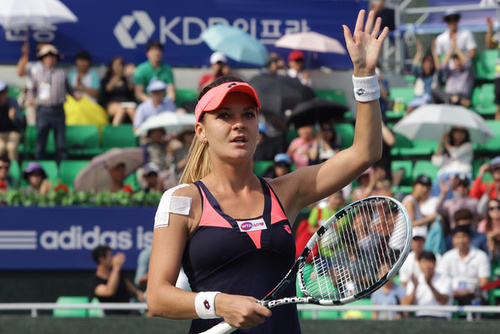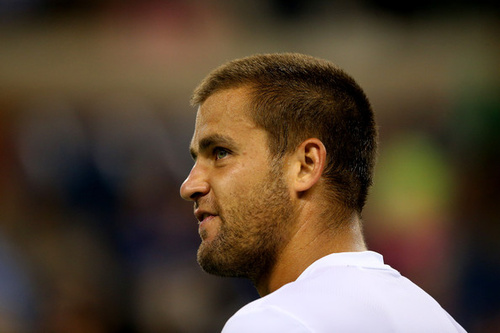Don't miss any stories → Follow Tennis View
FollowStuds and Duds: Reviewing the Week in Metz, Seoul, St. Petersburg, and Guangzhou
Ahead of more significant events in Tokyo and Beijing, four small tournaments in Metz, St. Petersburg, Seoul, and Guangzhou offered some players the chance to start the fall season on a high note. Among the most familiar were the Seoul champion and Metz runner-up, the only top-10 players in action this week.

Studs:
Agnieszka Radwanska: The world No. 4 entered Seoul as the clear title favorite, for no other top-15 woman appeared there. Ending an eight-month title drought, Radwanska lost more than four games in only one set this week. She will vie with Victoria Azarenka and Li Na for the marquee prizes this fall in the absence of Serena Williams and Maria Sharapova, and she has shone during this stage of the season before. Radwanska’s achievement in Seoul will have helped her to move past a disappointing US Open and the emotional adversity that confronted her this summer.
French comebacks: The Metz tournament offered the ideal stage for Jo-Wilfried Tsonga to scrape off his rust after a summer-long injury timeout. Tsonga had not played since Wimbledon, nursing a knee injury, so the defending champion in Metz will have felt relieved to reach the final again. The man who stopped him there, Gilles Simon, similarly used Metz to bounce back from an absence due to whooping cough. An unassuming counterpuncher, Simon overcame more than one imposing server on these indoor hard courts that usually favor offensively oriented players.
Anastasia Pavlyuchenkova: Opponents must knock her off early, or they may not knock her off at all. In one of the more puzzling seasons from any player on either Tour, Pavlyuchenkova has lost her first match at nine of 17 tournaments—and reached the final at four of the remaining eight, winning two. As the third seed in Seoul, Pavlyuchenkova held her ground against the canny Francesca Schiavone, a thorn in her side before. She also extended Radwanska deep into the third set of the final, which unwound dramatically through nearly three hours and 34 break points.
Ernests Gulbis: Not far from his native Latvia, St. Petersburg comes closer than any other event to being a “home tournament” for Gulbis. He has improved his consistency on hard courts dramatically this year, compiling a 26-3 record against opponents outside the top 10 while upsetting Andy Murray and Janko Tipsarevic. Thus, it should have surprised few observers to see Gulbis claim his second hard-court title of 2013 in St. Petersburg, where he recovered from a one-set deficit in the final to outlast Guillermo Garcia-Lopez. A strong fall will set up Gulbis to hold a seed at the Australian Open, a year after he held a ranking too low to earn direct entry there.
Kimiko Date-Krumm: One could view her upset with a glass half-empty, attributing it to the inconsistent second-half form of Maria Kirilenko. But that would be unjust to a woman who will turn 43 this month. Date-Krumm notched her first victory of 2013 over a top-20 opponent, proving that her comeback tour can continue as long as she sees fit.
Nicolas Mahut: The aging fast-court specialist reeled off the first two titles of his career on grass this summer, and some of the confidence gained there may have carried into a tournament on home soil. In Metz, Mahut upset Andreas Seppi in a classic example of how surface expertise can invert the usual hierarchy. The strong week bodes well for him early in the fall, which features faster surfaces in general than most other periods of the season.
Vania King: Streaky Serb Bojana Jovanovski had won eight straight matches in Tashkent and Guangzhou until she collided with King. The American doubles specialist survived a second-set bagel to battle through an airtight third set as she cooled off the hottest player of the tournament. That theme resurfaced a round later against the talented Monica Puig, who led 6-1 3-1 before King rallied. She eventually won five consecutive three-setters in the qualifying and main draws at Guangzhou, three after losing the first set, en route to her first final in seven years. For good measure, King also reached the doubles final in Guangzhou as she spent more than 18 hours on court there.
Wimbledon giant-killers: The man who defeated Rafael Nadal at Wimbledon last year, Lukas Rosol, had lost 10 straight matches entering St. Petersburg. Rosol defeated a quality opponent in Ricardas Berankis to end that drought, probably caused by the death of his father this spring. Meanwhile, the man who defeated Roger Federer at Wimbledon this year scored his first meaningful victory since then. Journeyman Sergiy Stakhovsky emerged from obscurity again to upset Wimbledon quarterfinalist Fernando Verdasco in St. Petersburg.
Local wildcards: Ranked outside the top 500, Korean teenager Su Jeong Jang rewarded organizers of the Seoul tournament for offering her a wildcard. En route to the quarterfinals, Jang stunned world No. 33 Klara Zakopalova for her first WTA main-draw win. Even more notable was the title run in Guangzhou by Chinese wildcard Zhang Shuai, highlighted by an upset over sixth seed Hsieh Su-Wei. This home hope did not drop a set en route to her first career title. The exploits of Zhang and fellow semifinalist Zheng Jie compensated for the absence of the top Chinese woman, Li Na, so far the only WTA player from Asia to become a true star. Like Chinese women’s tennis, Russian men’s tennis faces an uncertain future. In St. Petersburg, though, the 17-year-old home hope Karen Khachanov snatched two tiebreaks from the 63rd-ranked Victor Hanescu despite the gulf in their experience.

Duds:
St. Petersburg top seeds: Three times a finalist and once a champion in St. Petersburg, Mikhail Youzhny exited quietly in the second round at one of his home tournaments. Perhaps his quarterfinal run at the US Open left him depleted for the next event. A similar reason might account for the early exit of top seed Fabio Fognini, exhausted by an overloaded summer schedule from which he might not regroup until 2014. Two points from defeat, Fognini retired in a display of dubious sportsmanship.
Sorana Cirstea: The Rogers Cup in Toronto feels like a long time ago for the frustratingly erratic Romanian. After an early loss at the US Open, Cirstea exited in the first round as the top seed in Guangzhou. The loss came against last week’s Tashkent champion, Bojana Jovanovski, but someone who reached a Premier Five final this summer needs to win more than three games in that matchup.
Peng Shuai: Like Youzhny, Peng held the highest ranking of any home player at her tournament. Yet the Chinese double-fister fell routinely to a qualifier in the second round of Guangzhou. Peng can atone for that disappointment, though, with a stronger effort at the far more significant event in Beijing.
Jeremy Chardy: A quarterfinalist at the Australian Open, the Frenchman with the flamboyant forehand has won only two matches on hard courts this year outside Melbourne. He defeated top-eight contender Juan Martin Del Potro there—and lost this week to world No. 239 Marton Fucsovics.
German women: Andrea Petkovic’s momentum during the early summer has stalled in recent weeks with a three-match losing streak. Two of those losses came against Italian veterans Roberta Vinci and Francesca Schiavone, which suggests that Petkovic must sharpen her consistency to climb further up the rankings. She will hope for softer early draws than in Seoul, but soft draws have not helped compatriot Julia Goerges. Once considered a future star, Goerges has lost in the first or second round at 16 straight tournaments. Rising German prospect Annika Beck also failed to capitalize on her seeding in Seoul.
Martina Hingis: The five-time major champion had launched a doubles comeback this summer, partnering Daniela Hantuchova. Unable to win more than one match at any of five tournaments, Hingis pulled the plug on her 2013 campaign and remains doubtful regarding her 2014 prospects. One suspects that this second comeback may have ended more quickly and quietly than the first.










